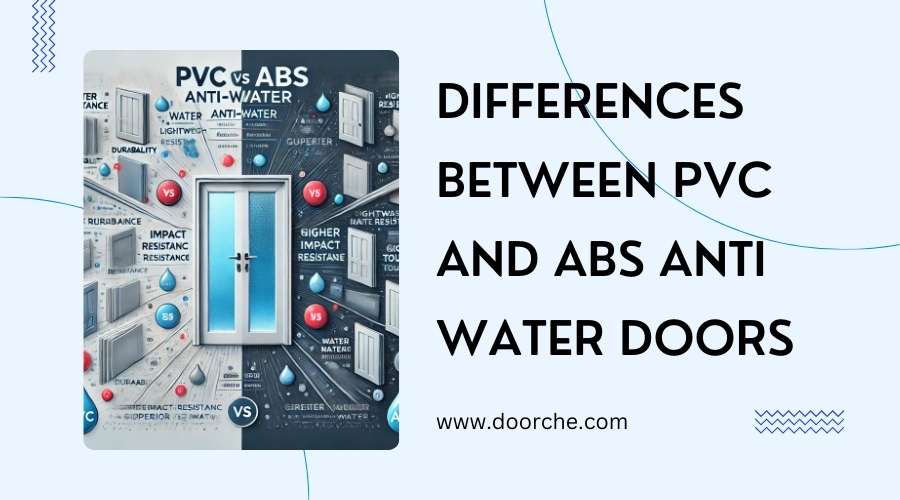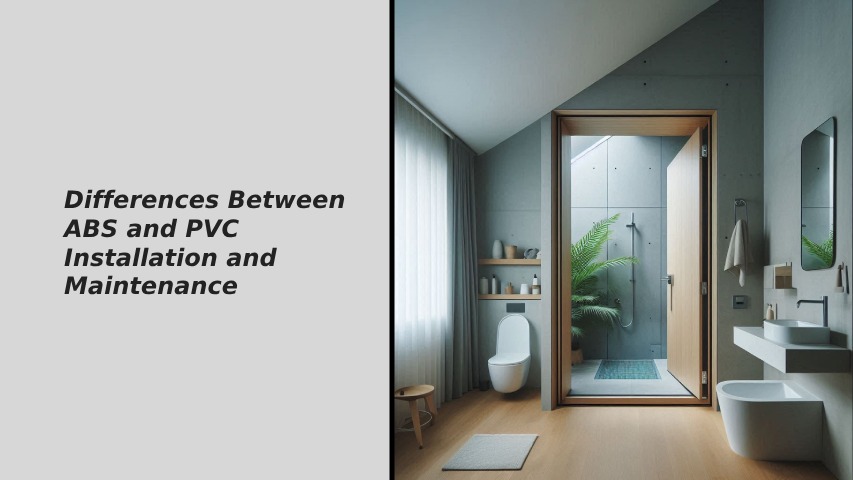Choosing the right door for environments exposed to moisture, such as bathrooms and toilets, is crucial to avoid frequent replacements due to damage. Two popular materials for such environments are ABS (acrylonitrile butadiene styrene) and PVC (polyvinyl chloride) due to their resistance to water and other environmental factors. This article explores the differences, uses, and benefits of ABS and PVC doors.

What is ABS ?
ABS (acrylonitrile butadiene styrene) is a plastic material known for its resistance to temperature changes, cracks, and scratches. It comes in various dimensions and can be designed to mimic leather or wood. ABS is often used to manufacture anti-moisture doors for bathrooms and toilets because it can be disinfected with antiseptic and cleaning agents without damage.
What is PVC ?
PVC (polyvinyl chloride) is another type of plastic material that is lightweight, durable, and easy to maintain. PVC doors are popular for their ease of installation, requiring only basic tools, making them ideal for DIY projects or quick installations of multiple doors. They are also low-maintenance and resistant to various elements like rain, snow, and intense sun. Additionally, PVC doors are energy-efficient and resistant to temperature changes, making them a suitable choice for humid environments.
Differences Between ABS and PVC

Installation and Maintenance
- PVC Doors:
- Easy to install with basic tools.
- Require minimal maintenance.
- Ideal for quick, multiple installations.
- ABS Doors:
- Generally easy to maintain.
- Can withstand frequent cleaning with disinfectants.
Durability and Resistance
- PVC Doors:
- Water-resistant and durable.
- Suitable for various weather conditions.
- ABS Doors:
- Resistant to temperature changes, cracks, and scratches.
- Can withstand disinfectants and cleaning agents.
Cost and Versatility
- PVC Doors:
- Generally lower cost.
- Lightweight and versatile for different environments.
- ABS Doors:
- Slightly higher cost due to material properties.
- Available in various finishes that mimic other materials.
Advantages of ABS Over PVC
While both ABS and PVC doors are excellent choices for moisture-prone environments, ABS offers several advantages:
- Enhanced Durability: ABS doors can withstand a wider range of environmental factors, including intense sun, rain, and snow, without degrading.
- Resistance to Cleaning Agents: ABS can be cleaned with strong disinfectants and antiseptics, making them particularly suitable for bathrooms and toilets where hygiene is a priority.
- Aesthetic Variety: ABS can be manufactured to look like leather or wood, offering more aesthetic choices.
Conclusion
Both ABS and PVC doors are excellent for environments exposed to moisture due to their water-resistant properties and durability. However, the choice between the two depends on specific needs:
- PVC Doors are ideal for those looking for an affordable, easy-to-install, and low-maintenance option.
- ABS Doors are better suited for those needing enhanced durability, resistance to disinfectants, and a wider range of aesthetic finishes.
Understanding these differences can help in making an informed decision that ensures longevity and performance in a moisture-prone environment
